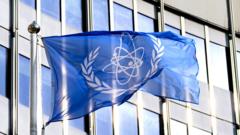In a significant development, for the first time in two decades, the International Atomic Energy Agency (IAEA) has officially declared Iran as being in breach of its nuclear non-proliferation obligations. This motion received backing from a coalition of 19 nations, including the United States, the United Kingdom, France, and Germany.
Global Nuclear Watchdog Alleges Iran's Non-Compliance with Nuclear Obligations

Global Nuclear Watchdog Alleges Iran's Non-Compliance with Nuclear Obligations
The IAEA holds Iran accountable for failing to meet critical nuclear commitments, raising international tensions.
The IAEA's resolution cites Iran's "numerous failures" to provide satisfactory answers regarding its undeclared nuclear materials and activities, constituting a serious violation of their commitments. Additionally, the agency expressed heightened concern over Iran's growing stockpile of enriched uranium, which holds potential for both reactor fuel and nuclear armament.
Iran has strongly criticized the resolution, labeling it a politically motivated act and announced plans to establish a new nuclear enrichment facility. This move follows a recent IAEA report highlighting Iran's insufficient cooperation and its possession of uranium enriched to nearly weapons-grade levels—enough potentially for nine nuclear weapons.
The 2015 nuclear agreement negotiated with six world powers required Iran to limit its nuclear pursuits while providing continuous oversight by IAEA inspectors. However, the U.S. withdrawal from this deal in 2018, under President Donald Trump, marked a turning point, leading Iran to progressively disregard the stipulated restrictions on uranium enrichment.
At the IAEA board's meeting in Vienna, Russia, China, and Burkina Faso opposed the resolution, while eleven countries abstained. The stated concerns from the IAEA depict Iran’s ongoing non-compliance and a lack of transparency, complicating the verification of the peaceful nature of its nuclear program.
European nations have indicated that the matter could escalate to the United Nations Security Council, with potential for reinstating previously lifted sanctions against Iran under the 2015 agreement, should Iran not alter its course. A joint statement from France, Germany, the UK, and the US implored Iran to embrace the opportunity to adhere fully to its nuclear obligations.
In response, Iranian officials condemned this political maneuver, emphasizing their intentions to enhance their uranium enrichment capabilities with advanced technology. Iran's Foreign Minister remarked that the resolution complicates ongoing negotiations for a new nuclear agreement with the U.S. amidst escalating tensions in the region.
The upcoming sixth round of discussions is anticipated to be critical, but uncertainties linger as Iran firmly maintains its stance on enriching uranium as an inalienable right. In the backdrop of this rapidly evolving situation, the potential for confrontation remains palpable, with threats exchanged between Tehran and Washington, amidst heightened military readiness from Israel regarding Iran’s nuclear ambitions.
Iran has strongly criticized the resolution, labeling it a politically motivated act and announced plans to establish a new nuclear enrichment facility. This move follows a recent IAEA report highlighting Iran's insufficient cooperation and its possession of uranium enriched to nearly weapons-grade levels—enough potentially for nine nuclear weapons.
The 2015 nuclear agreement negotiated with six world powers required Iran to limit its nuclear pursuits while providing continuous oversight by IAEA inspectors. However, the U.S. withdrawal from this deal in 2018, under President Donald Trump, marked a turning point, leading Iran to progressively disregard the stipulated restrictions on uranium enrichment.
At the IAEA board's meeting in Vienna, Russia, China, and Burkina Faso opposed the resolution, while eleven countries abstained. The stated concerns from the IAEA depict Iran’s ongoing non-compliance and a lack of transparency, complicating the verification of the peaceful nature of its nuclear program.
European nations have indicated that the matter could escalate to the United Nations Security Council, with potential for reinstating previously lifted sanctions against Iran under the 2015 agreement, should Iran not alter its course. A joint statement from France, Germany, the UK, and the US implored Iran to embrace the opportunity to adhere fully to its nuclear obligations.
In response, Iranian officials condemned this political maneuver, emphasizing their intentions to enhance their uranium enrichment capabilities with advanced technology. Iran's Foreign Minister remarked that the resolution complicates ongoing negotiations for a new nuclear agreement with the U.S. amidst escalating tensions in the region.
The upcoming sixth round of discussions is anticipated to be critical, but uncertainties linger as Iran firmly maintains its stance on enriching uranium as an inalienable right. In the backdrop of this rapidly evolving situation, the potential for confrontation remains palpable, with threats exchanged between Tehran and Washington, amidst heightened military readiness from Israel regarding Iran’s nuclear ambitions.



















